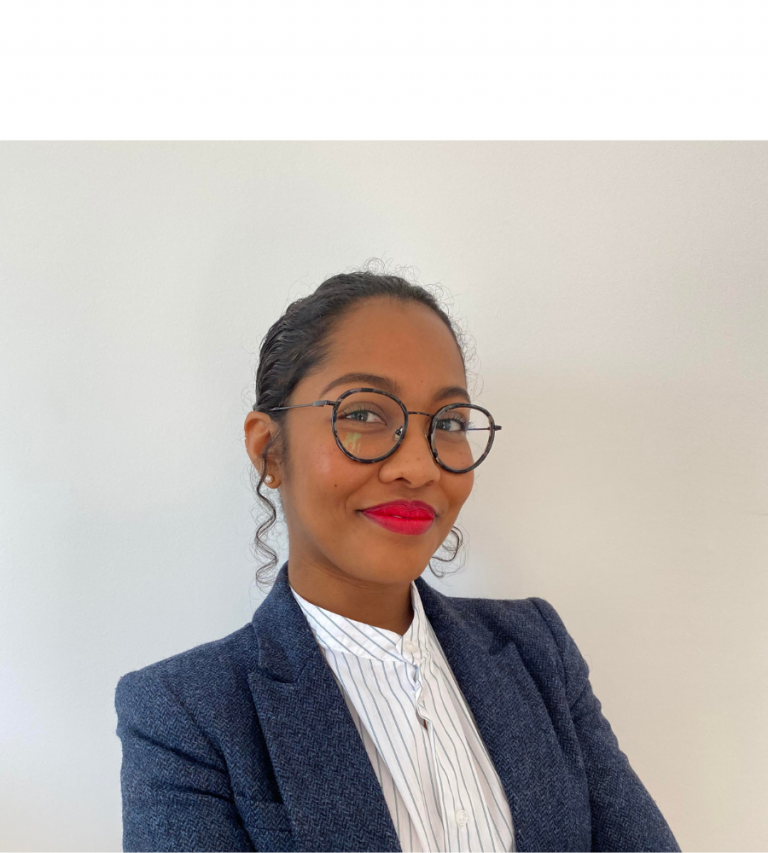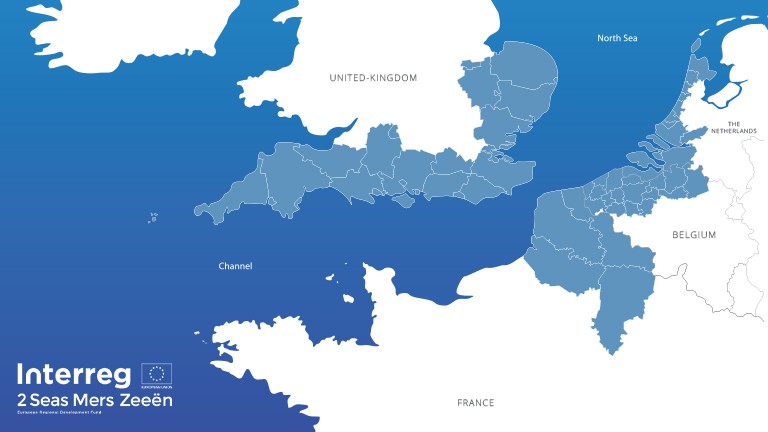Partner of the month interview: Interreg 2 Seas
- 08 September 2021
- Francien Horrevorts
One of the strengths of Polder2C’s is that it is an international project, where many parties work together, share expert skills and facilitate knowledge transfer. A total of thirteen partners from the Netherlands, Belgium, France and the United Kingdom participate in the project. Each month we put one of our partners in the spotlight. In September it is Interreg 2 Seas.
Interreg 2 Seas
Interreg 2 Seas 2014-2020 is a European Territorial Cooperation Programme covering England, France, the Netherlands and Belgium (Flanders). The Programme is part-financed by the European Regional Development Fund and has a total of €241m ERDF to co-finance projects in the 2014 - 2020 period.
Catherine Ramampy, Finance Officer, represents Interreg 2 Seas and answers our questions.

What is the core business of your organisation?
"The overall objective is to develop an innovative, knowledge and research based, sustainable and inclusive 2 Seas area, where natural resources are protected and the green economy is promoted. In order to realise this, 82 cross-border cooperation projects, directly contributing to one of the 2 Seas Specific Objectives, have been selected. These projects receive up to 60 % of their total project budget.
One of these projects is Polder2C’s. With € 3,9 mio of ERDF budget, this project has received an important financial support to prepare the 2 Seas region for the emerging trend in climate change. Polder2C’s objective perfectly fits the Programme Specific Objective 3.1, which is to improve the ecosystem-based capacity of 2 Seas stakeholders to climate change and its associated water-related effects.
The 2 Seas Specific Objectives are clustered per Priority Axis as follows:
1. Priority Axis 1: Technological and social innovation
- 1.1: Improve the framework conditions for the delivery of innovation, in relation to smart specialisation.
- 1.2: Increase the delivery of technological innovation in smart specialisation sectors.
- 1.3: Increase the development of social innovation applications to make more efficient and effective local services to address the key societal challenges in the 2 Seas area.
2. Priority Axis 2: Low-carbon technologies
- 2.1 Increase the adoption of low-carbon technologies and applications in sectors that have the potential for a high reduction in greenhouse gas emissions.
3. Priority Axis 3: Adaptation to climate change
- 3.1 improve the ecosystem-based capacity of 2 Seas stakeholders to climate change and its associated water-related effects.
4. Priority Axis 4: Resource efficient economy
- 4.1: Increase the adoption of new solutions for a more efficient use of natural resources and materials.
- 4.2: Increase the adoption of new circular economy solutions in the 2 Seas area."

What is the role of your organisation/you as a person in the Polder2C’s project?
"In the Interreg architecture, we are what is called a Joint Secretariat. The Joint Secretariat is responsible for the day-to-day management of the Programme on behalf of the Managing Authority. The Joint Secretariat of the 2 Seas is therefore responsible for the management of the Cooperation Programme in the areas where the Managing Authority (MA) intervenes, namely the coordination and facilitation of the Programme, the evaluation of the project, the Programme monitoring and administration. In other words, we are on the front line when it comes to monitoring the projects’ progress or providing the necessary assistance to the projects on a daily basis.
For my part, I am Finance Officer at the Joint Secretariat of Interreg 2 Seas and I am responsible for a portfolio of 9 projects, of which Polder2C's is a part, mainly focusing on the Priority Axes Technological and social innovation and Adaptation to climate change. Within the framework of Polder2C's, I am what we call "Lead officer". This means I am in charge, at the Joint Secretariat, of the project. I must therefore on a daily basis: evaluate the annual progress reports of the project, evaluate the FLC (First Level Control) checklists of project partners financial claims, animate the annual contacts of the project, manage with the project the risks that may appear, manage deviations, etc. Quite simply my role is to support the project on a daily basis and check that the schedule, the content of the contract and the initial quality criteria are respected. The reason why I am a "Finance officer" and not a "Project officer", even if the missions listed above seem to come close to it, is due to the fact that my horizontal mission within the Programme relates to State aid."
"Polder2C's perfectly illustrates the complementarity of approaches and techniques that exist on a cross-border scale and it shows that faced with climate change, it is together that we can find the best answers."
Catherine Ramampy
What have we gained from the Polder2C's project until now, do you think?
"Polder2C's is a very good example of a cross-border project at all levels (geographic, thematic, communication, etc.). First of all because the Living Lab on which the tests are carried out is located on the Dutch-Belgian border and involves partners from the 4 Member States. Then, it is a project that focuses on an essential theme of the 2 seas area, namely flood resilience. This perfectly illustrates the complementarity of approaches and techniques that exist on a cross-border scale and it shows that faced with climate change, it is together that we can find the best answers. The project is therefore perfectly in line with the Programme and contributes to achieving the Programme's strategy."
What innovation or development are you eagerly waiting for?
"I hope that the project will be successful and that the tests on the resistance of the levee and the emergency responses will be conclusive and will lead to the durability of the results of the project. I also hope to have the opportunity to visit the field station when it is finished."
What is the best thing someone can do to contribute to climate adaptation?
"I think the best thing to do is to have the reflex to learn about the environmental impact of each of our actions in order to make informed consumption choices because each of us is now responsible in the face of climate change. Finally, I would say that it is important to continue to educate the public about existing climate risks and the possible responses that exist."
